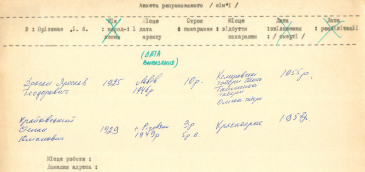16-year-old Mariia and 18-year-old Anastasiia from Russia-occupied Kherson were deported to temporarily occupied Crimea. The girls were invited for a two-week-vacation at a children’s camp by their school teacher at the very time when their lives in a native city were threatened by systematic shelling of residential quarters by the Russian forces.
Mariia went to Crimea without her parents’ consent: instead, her sister secretly signed up a power of attorney she used to cross the border. Likewise, 18-year-old Anastasiia entered the peninsula with forged documents, which indicated that she was 17 at the moment. The girls took a 9-hour-long bus trip to Crimea alongside dozens of Ukrainian children.
During their stay at the camp, children were obliged to obey all commands by their counsellors and participate in every scheduled activity even if they felt unwell. According to Anastasiia, children repeatedly attended Russia-themed concerts and had to stand up for the Russian national anthem which concluded each of them: ‘Those who didn’t stand up — including Mariia and myself — were told that we were eating their bread and had to stand up for the Russian anthem’. Once, the teenagers placed a blue-and-yellow balloon heart on the wall and were shouted at by the director of the facility, who ripped it off.
By the end of their two-week-stay, the girls learned of the de-occupation of Kherson by the Ukrainian Army. At the same time, they realized that Russian authorities didn’t plan to return them back: instead, the children were transferred to another facility in nearby Henichesk that was still remaining under Russian control. At the new place the children were poorly fed, showered only once a week and slept together to keep themselves warm in a cold dormitory, whose doors they weren’t permitted to lock up.
At 7 am, they were woken up to attend school lessons, headed for Russian educational plans. The kids were forced to speak and write solely in Russian, while teachers persuaded them to adopt Russian citizenship, as they would allegedly never come back to Ukraine. Everytime the girls tried to rebel, the occupiers reminded them of a “pit” (torture chamber), the “military commandant’s office” or promised to “stitch their mouths” — the threats they couldn’t dismiss as two boys from their entourage had been previously taken to the torture chamber several times.
The rescue of the girls was single-handedly arranged by a journalist, Yuliya Khymernyk, who learned about their deportation from Mariia’s social media. She contacted the teenagers and offered to come up with a legend about a supposed wedding of their brother, who allegedly lived in Saint-Petersburg, Russia. The situation was complicated by the fact that one of the girls was a minor who could not leave freely, and her parents hesitated to support her return to battle-scarred Kherson. Despite 16-year-old Mariia could be declared wanted even before crossing the checkpoint, the girls managed to successfully reach Kyiv. They were completely stripped at the border with Russia, but they were still allowed through.


